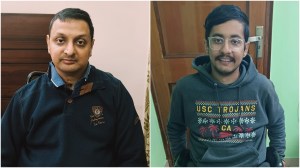Through thick, not thin, say ragpickers
Mumbai, November 22: Mumbai's army of ragpickers who trawl the streets looking for recycleable material have had enough of the thin plastic ...

Mumbai, November 22: Mumbai8217;s army of ragpickers who trawl the streets looking for recycleable material have had enough of the thin plastic carry bag, better known as the jhabla.
8220;Halka maal hain, bilkul nahin chalta.8221; 25-year-old Rana Haldar peeps out of a putrefying rubbish dump in the city8217;s slum and scrap suburb Dharavi. Haldar ignores the thin plastic bag and rifles around the bin looking for tins and paper.
Another ragpicker, Mohammed Yunus, has since graduated to scouring the streets for the more profitable sack cloth. 8220;A few years ago, I had to stumble around for a whole day before I could collect a kilo of thin plastic bags which fetched only Rs 1.50.8221; He now earns Rs 150 a day collecting cloth. And then you realise why the thin plastic bags lie around waiting to get into sewer lines or dirty the roads. It8217;s because no self-respecting ragpicker is willing to touch them. As any one of them will tell you, it takes a day of back-breaking effort to collect 1,000 bags to make awaist-high saleable kilo. 8220;It8217;s just not worth the effort,8221; says ragpicker Abdul Rahim, who8217;s picking up the thicker plastic bags.
Ragpickers have welcomed the government8217;s proposal to ban thin carry bags and instead introduce the thicker bags of a minimum thickness of 80 gauge. 8220;It will make our job far easier,8221; Rahim says. Squatting on his pavement shop at Dharavi, a wizened sixty-something scrap trader Abdul Haq has had enough of the thin plastic bag. 8220;Yeh jhabla nahin, jhamela hain,8221; curses the grizzle bearded trader, separating the carry bags from a mound of plastic waste. The rest of the plastic is sold to bigger traders for Rs three a kg, but as the thin bags are a strict no-no, Haq has to separate them from his precious pile. The thick plastic bags are melted down into little pellets, the raw material for a thriving industry which makes buckets, pipes and footwear out of them.
But the thin bags sit in a sack on his roof. 8220;Small shop owners like us don8217;t buy these bags, nobody wantsthem,8221; scrap dealer Abdul Hamid adds. 8220;The government must ban these bags. When factories stop producing thin bags, the public will automatically stop using them,8221; Haq advises. He then goes on to extol the virtues of paper bags to curious bystanders. 8220;The paper at least dissolved in water, but not these plastic bags.8221; On the Dadar beach, ragpicker Dattaram Kadam rummages through a rubbish tip with a stick. Thin plastic bags don8217;t figure on his list, but the thicker milk pouches do. He washes the thick milk bags in the sea, dries them before selling them for as high as Rs 20 a kg. 8220;Thicker bags are of great use to us,8221; he says.
- 01
- 02
- 03
- 04
- 05































